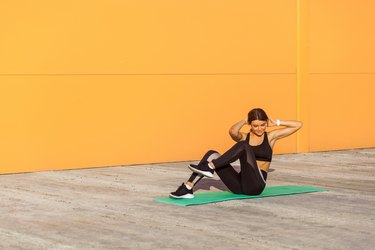
Conflicting opinions from the fitness and medical communities concerning eating before exercise can make working out confusing. While one expert advises you to eat a healthy snack before exercising, another may note that you'll burn more fat on an empty stomach.
By understanding the potential problems of working out on a full stomach, you can better understand the conditions in which empty stomach exercise is better. Your own physique and health may dictate whether or not it's bad to work out on a full stomach.
Video of the Day
Video of the Day
Tip
Working out on little or no food is better for you than working out on a full stomach.
Cardio on a Full Stomach
Eating a large meal before exercise can often cause problems, particularly if you tend to engage in strenuous exercise. Doing so can create cramps in your midsection, which is a condition sometimes referred to as the "stitches," according to the University of Texas Austin.
You may also feel nauseated. This can prohibit exercise or cut your workout short. Foods that are high in fat or fiber are the most likely to cause discomfort during an exercise session, since they take longer to digest than carbohydrates and other types of food.
Read more: Is Cardio Good to Do on an Empty Stomach?
Exercise-Induced Anaphylaxis
In some cases, eating before a meal can cause serious problems if you experience exercise-induced anaphylaxis. Exercise-induced anaphylaxis, or EIA, can be described as an allergic reaction to exercise —more commonly with aerobic exercise than strength training, according to the University of Rochester Medicine — specifically when you've eaten an aggravating type of food beforehand.
You may experience hives, coughing, wheezing, swelling of the face, hands and airways and itchiness. This is triggered by eating foods that you have an allergic sensitivity to before exercise. If you cannot pinpoint the food that is causing the reaction, your doctor may caution against eating anything six to eight hours before a workout.
Read more: Does Working Out Without Eating Increase Fat Burn?
Fasting Before Exercise
The American Council on Exercise points out that exercising aerobically or weight training on an empty stomach may help you burn more fat, since your body burns fat storage for energy rather than using food energy to sustain your exercise. Still, the dangers of working out on an empty stomach could leave you feeling malnourished and susceptible to dizziness, lightheadedness and even fainting.
Without sufficient energy to sustain exercise, you might be forced to cut your workout short. It can short-circuit your workout in other ways as well. You could be so hungry, that instead of concentrating on whatever exercise you're doing, you could be dreaming about your next meal. And because of that, your next meal could be out of proportion to your needs due to your intense hunger. In other words —you might eat too much.
Read more: How Long After You Eat Can You Work Out?
Pre-Workout Snacks
The happy medium between exercising on a full stomach and fasting before a workout is having a small but nutritious pre-workout snack that contains both protein and carbohydrates. For instance, cheese and whole wheat crackers, vegetables and hummus, or a protein smoothie can help give you the energy to sustain a healthy workout without making you feel sick.
If you experience exercise-induced anaphylaxis, focus on foods that won't cause a reaction and talk to your doctor about treatment and prevention methods.
Is this an emergency? If you are experiencing serious medical symptoms, please see the National Library of Medicine’s list of signs you need emergency medical attention or call 911.